My right-hand woman, Tabytha, sat next to me in the dark sunroom of the farmhouse the last night of the Women’s Retreat. WhileI rocked her precious baby girl, she said, “I just noticed when we took the picture that you're the only black woman here.” We giggled, and I said, “You're just now seeing that!” It tickled me because Tabytha is often the only white woman in my Writing Accountability Group; she’s the minority and has no problem with it whatsoever. Anyway, I told her I'm used to being the only black person. I didn't go into detail about my childhood church because it didn't matter. God didn't bring me to the farmhouse to discuss racial reconciliation, but as a sister in that house, I bore witness to the Holy Spirit's ability to bring people together in Jesus Christ, no matter what we look like.
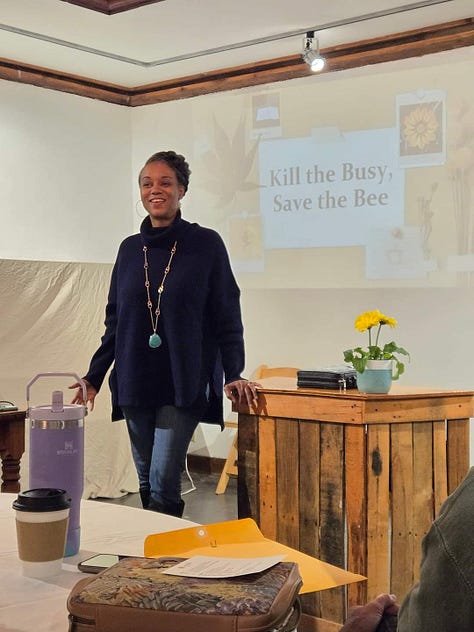
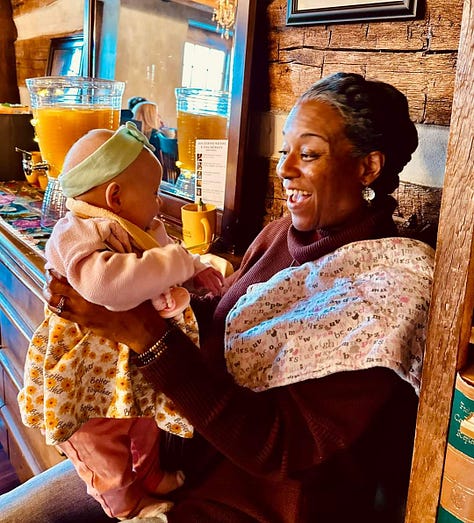
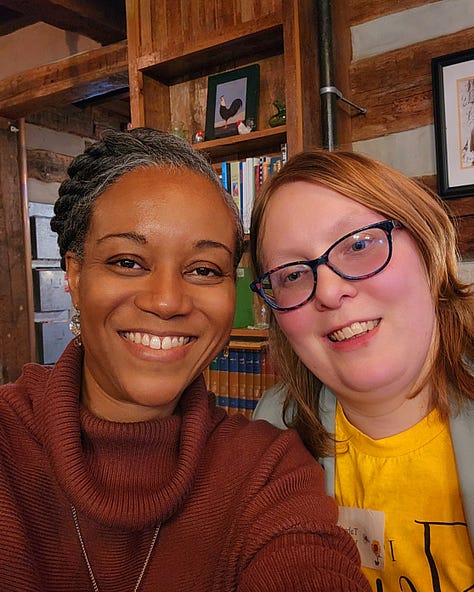
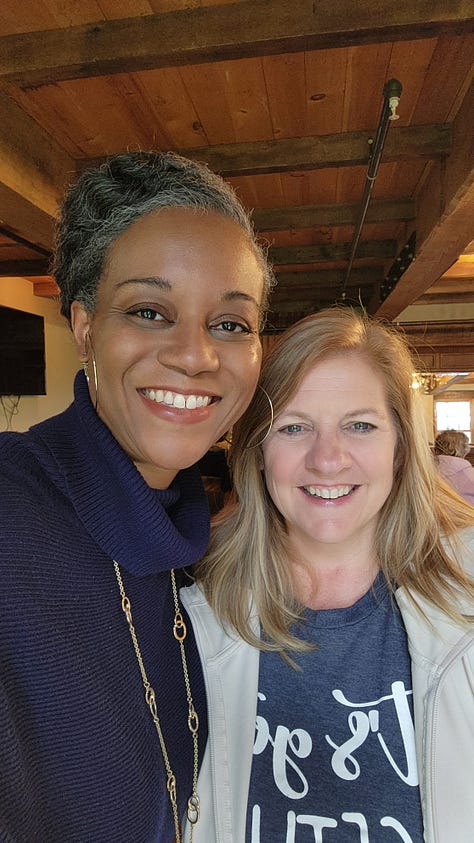
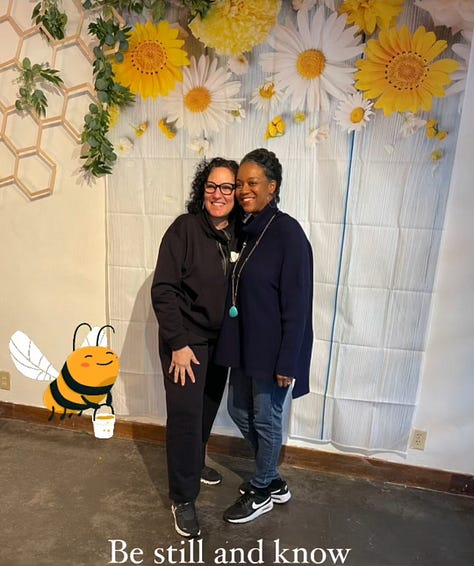
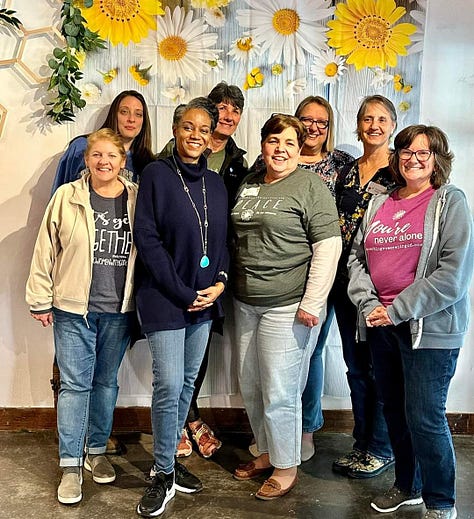
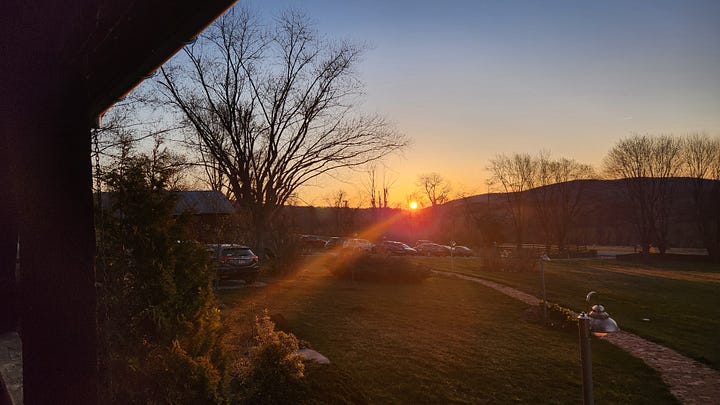

This past weekend, I had the opportunity to speak at a Women’s Retreat hosted by The Connection, a women’s ministry organization with the mission to connect women to God and each other. It's easy to see that I'm the only black woman in the picture (the only woman of color besides my Puerto Rican sister from another mother, Ramona). This didn’t matter one bit, though, because I felt completely comfortable there. I was welcomed by the Holy Spirit when I opened the farmhouse door to find the entire Connection Team in a circle, praying for me and all the women who were on their way. As soon as the last person said, “Amen,” I received warm greetings, hugs, and smiles. Throughout my time with these ladies, I was blessed with words of encouragement, grace, hospitality, good food, laughter, affirmations, peace, wisdom, and love. From Friday evening to Palm Sunday morning, these ladies confirmed that what the Lord laid on my heart to share impacted them. Our time together was nothing short of family in Jesus' Name.
Did I think about the fact that I was the only black woman? Of course. I even told my husband before I left that I would most likely be the only black woman. There were no feelings attached to that statement. No fear or worry. It was just a fact. Of course, being a minority is difficult in certain spaces because of our country's history, current racial tension, microaggressions, and flat-out racism. I understand. Trust me when I say I have experience in not just feeling out of place due to my own insecurities about being black but being in the wrong place where there was no doubt about how someone else felt about me being black. With all that being said, I found it a privilege to be a black woman crossing racial divides at this retreat as a guest and as a speaker! The truth is, God prepared me for it!
Though my dad grew up in church, he didn't receive the gospel until he was a young adult. As a young believer, he loved studying the Bible. So much so that when it was time to find a church for his young family, he searched for a church that taught the Bible. It was the most important thing to him. The worship music wasn't the priority, the style of preaching wasn't the priority, the children's ministry wasn't the priority, and the number of black people in the church wasn't the priority. What mattered most was the Bible. We were one of two families of color in the church he ended up choosing.
As a child this didn't matter to me one bit. I felt no different, nor was I called out or treated any differently. Could there have been racist people there? Maybe, but God shielded me from them, or I didn’t notice them. When I became a preteen, there was definitely a feeling of being on the outside and seen as different. When I look back on it now, there were clear signs of ignorance among some of those in my church youth group. Sadly, I may have been the only black girl that they knew up close.
But the most unfortunate thing about my youth group and the whole church I grew up in was the lack of appreciation of cultural differences. I grew up in the 80s and 90s when churches really didn't know how to even integrate, let alone embrace cultural differences. However, with all the issues the church I grew up in might have had, I'm glad God planted me there. It was where I learned about Jesus and how to follow Him. It's where I memorized verses in Pioneer Girls and sang songs during Vacation Bible School. It was where I learned to be the only one who looked like me in a room and be okay. It's where I learned how to be gracious to those who didn't realize or care that what they said about my differences made me feel sad. God put me in that church, and I'm grateful!
The central focus of Christ’s church should be Christ, and because His gospel is for every nation, tribe, and tongue, cultural differences need to be embraced in the church. After all, the gospel is what brings us together: to lift each other up in our sufferings and to celebrate with one another (1 Cor. 12:26). Getting past racial tension or awkwardness starts with an intentional effort to invite, appreciate, and love those who we see as different from ourselves. This takes courage because we run the risk of being rejected, but it’s worth it for the sack of the gospel. Wouldn't you agree? Ruthie, one of the organizers of the retreat, certainly thought it was worth sending me an invitation to be the keynote speaker for The Connection Women’s Retreat, and I received it with gladness!
Whether you’re young, old, white, black, introverted, extraverted, suburbanite, or city dweller, don’t be afraid to show love to someone who may not be in your “people group.” When you do, you will discover how the gospel brings unity to the body of Christ. It is the common ground from which flowers of all shapes, sizes, and colors spring forth!
In Acts 10, Peter received a vision from the Lord, and through that vision, he realized that salvation was not only meant for the Jews but also for the Gentiles. In obedience to God, Peter crossed cultural divides and religious pretenses so that Cornelius, a Greek centurion who also obeyed the angel of God, could hear and receive the gospel. Not only did Cornelius hear and receive, but so did “a large gathering of people” who were in his house. If Peter had refused to go into the house, how would the people come to know Christ? (Romans 10:14-15). Peter had to be okay with being the only Jew in the room.
In Acts 8, Phillip obeyed God when he was told to go to Gaza. And on his way, being led by the Spirit, Phillip put away all of his religious pretense, all of his prejudices, and any fear of talking to someone “different.” He saw an Ethiopian man reading the prophet Isaiah, searching for the truth of God. He read:
“Like a sheep he was led to the slaughter
and like a lamb before its shearer is silent,
so he opens not his mouth.
In his humiliation justice was denied him.
Who can describe his generation?
For his life is taken away from the earth.”
The man wanted to know who Isaiah was referring to in this scripture. Verse 35 of Acts 10 says, “Then Philip opened his mouth, and beginning with this Scripture, he told him the good news about Jesus.” This is what happens when we break racial, cultural, ethnic, and generational divides! The Holy Spirit uses us to speak the Word of Truth, and people get saved, delivered, blessed, and restored.
While I was at the retreat, I didn't think, "Oh no, I'm the only black person. They won't understand me." Instead, I thought, "I wish more women of color were here to experience what these women are giving to the world." So that is my prayer. That women of all backgrounds, ages, and cultures would experience the love of Jesus Christ through The Connection ministry. Amen.
My pastor, Dr. David Anderson, coined the term gracism. Instead of racism, which uses race to reject others, gracism uses race to embrace others. While race is a springboard for this concept, gracism transcends race and encompasses various differences among people. In his book, Gracism: The Art of Inclusion, Dr. Anderson references I Corinthians 12:22-26 to establish eight sayings of a gracist:
I will lift you up.
I will cover you.
I will share with you.
I will honor you.
I will stand with you.
I will consider you.
I will celebrate with you.
I will heal with you.
Understanding one another in the body of Christ can be challenging. Like any loving relationship, some conversations are hard, and so is taking the time to understand one another. But the Holy Spirit has given us the power to do hard things. Just read about what Jesus, the King of kings and Lord of lords, did for His disciples in John 13:1-17. And remember what He did for all of us on the cross. Let us begin by loving one another (John 13:34).
You can find me in the following places:
Amazon: Yvonne Marie
Audible: Yvonne Marie
Goodreads: Yvonne Marie

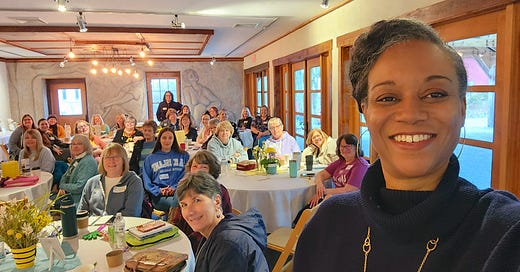












Share this post